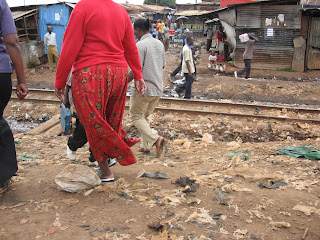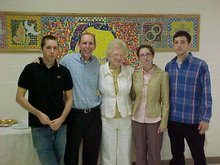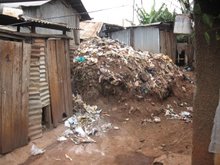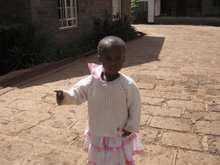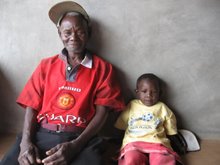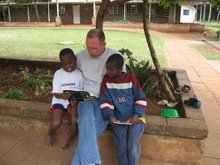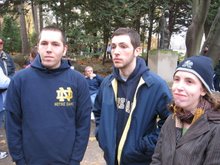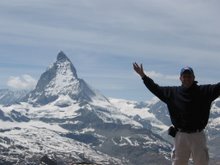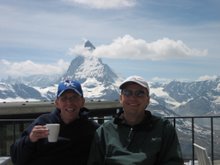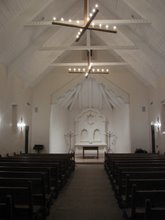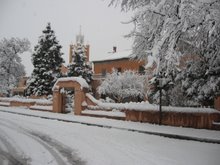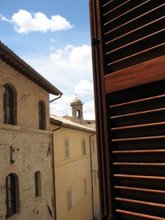 One of the most difficult days to write about, not just because of the devastating impact of a slum, but the difficulty one has in describing such conditions. I had read about the area, the feel, the smell, the sadness, the disease, but I could never have prepared myself for what I was going to experience. I remain, even through the sadness and all, extremely grateful for this life changing experience.
One of the most difficult days to write about, not just because of the devastating impact of a slum, but the difficulty one has in describing such conditions. I had read about the area, the feel, the smell, the sadness, the disease, but I could never have prepared myself for what I was going to experience. I remain, even through the sadness and all, extremely grateful for this life changing experience.I was back at the orphanage for about an hour after Kibera. I showered right away yet I could still smell the smells. I put my muddy clothes and boots
 outside, not knowing how to adequately clean them. I can still see the faces, the houses, the mud and grime. I was grateful to have spent the day with Sr. Teresa Little. She is an Indian sister and one of nine children from southern India. Sr. Little is a scavenger. She is a saint. She is hard. She is prayerful and lovingly funny. I don’t know how I was so fortunate to spend so much time with her. Because of our time and an unplanned 5KM walk home, we got to talk a lot about our lives and our work. You could sense her frustrations at time. If she was frustrated or angry, it was for her people. I was also able to go to mass at her little convent chapel before we left.
outside, not knowing how to adequately clean them. I can still see the faces, the houses, the mud and grime. I was grateful to have spent the day with Sr. Teresa Little. She is an Indian sister and one of nine children from southern India. Sr. Little is a scavenger. She is a saint. She is hard. She is prayerful and lovingly funny. I don’t know how I was so fortunate to spend so much time with her. Because of our time and an unplanned 5KM walk home, we got to talk a lot about our lives and our work. You could sense her frustrations at time. If she was frustrated or angry, it was for her people. I was also able to go to mass at her little convent chapel before we left.We left for Kibera early in the morning. Like most days, we had a driver to drive us to the slums. It was a short 15 minute trip from Nyumbani Children’s Home to Kibera. We passed polo grounds and a fairground. Such wealth juxtaposed against the largest slum in Africa. We turned the car onto Kibera Road and there is was before us. We got a glimpse of the sea of rusted metal roofs, houses packed into a space about the size of NYC Central Park. We drove closes to see the piles of trash, plastic and junk. Little children scavenging through the trash. Then came the smell. The smell of red dirt, rot, mildew, sewage, kerosene, charcoal smoke – the smells I had been told about – Kibera. We drove past hundreds of people walking somewhere, nowhere. We passed dilapidated kiosks which looked abandoned but were not. We drove past sheds selling various wares until we turned and came to a dead end at a run down school site.
 To the left was the entrance to Lea Toto, the outreach program for AIDS children operated by Sr. Little and Nyumbani. A couple of things have changed life somewhat in Kenya. First, those with HIV or AIDS are now permitted to attend public school. Second, there has been the advent of ARVs or antiretroviral medications. Leo Toto attempts to care for those children with AIDS by getting them the needed ARVs and food nutrients necessary to allow the meds to work. Lea Toto program is funded now by USAID.
To the left was the entrance to Lea Toto, the outreach program for AIDS children operated by Sr. Little and Nyumbani. A couple of things have changed life somewhat in Kenya. First, those with HIV or AIDS are now permitted to attend public school. Second, there has been the advent of ARVs or antiretroviral medications. Leo Toto attempts to care for those children with AIDS by getting them the needed ARVs and food nutrients necessary to allow the meds to work. Lea Toto program is funded now by USAID.We met many Lea Toto moms (HIV+) in the program with their children. They make money by making some crafts and bead work. They are given counseling as well as meds and food. We toured the main “clinic” rooms and a nearby daycare operation. I was able to meet with a man who was not an MD but close. He spoke of his daily schedule and his work. Many come to the “clinic” for HIV testing, which can be sent back to Nyumbani or on to the hospital for more involved testing. There are other handicaps – not just HIV and AIDS. Many in Kibera have TB or measles, malaria, yellow fever and more. Health care in the slums is not a priority in the lives of the extreme poor. Sadly he tells us of women who sell the ARVs for food money, sacrificing the sick child. Some receive food for the HIV child but, of course, must distribute that food to the entire family. The sick child does not get all the nourishment necessary. In some cases, the children seem disposable, some are left to die or are abandoned either by choice or because the parents are too sick to care for them or have died in the home. Children are confused and don’t understand the whys or whats of the disease. Prostitution is another problem in the area. The spread of disease, whether through prostitution or ignorance continues. There are estimates that one fourth of the AIDS sufferers in Nairobi live in Kibera. Anywhere from 25% – 50% of its residents are HIV+. Every 14 seconds, a child is orphaned by AIDS in sub-Saharan Africa.
With the disease so common, one would think that there would not be the stigma we might find in the US. But there continues to be strong denial and rejection of the disease. This seemed to be more the issue with the men of Kibera. Many will not be tested, but they are obviously sick.
Two women who lived in Kibera were trained as “social workers” and do home visits took us into the main district of the slums to make about seven home visits or calls. Sr. Little went with us and we started out, probably looking like an interesting group. There seemed to be no other mzungus in the area. I took off my UK hat to reduce attention. Of course I got sunburned! Every child we would pass would yell “How are yyyyoooouuuu?” and grab my hand. We walked through garbage, mud, human waste. We passed children and adults who were obviously sick or on glue. Some were washing clothes in buckets, some cooking in charcoal fires. We walked small hills of metal shacks in which we would not house our dogs. We would not allow our children around the rusted, jagged metal, let alone the crap in the alleyways. We would not allow our children to view such sad situations.

And then we entered a “house” of one room, maybe 10’ x 10’ The walls were metal drums, pounded flat, covered with old calendars, posters, some lace material. There was not electric and the most difficult adjustment was to the lack of light; There was no light. It was so dark that your eyes had to adjust to see the black faces of those in the room. Inside the houses, women burn charcoal grills or kerosene to cook what food they could procure. The roof was metal and burned my hand to the touch from the suns heat. The woman in the house said she had been in that house for three years with 7 or 8 others. She had wanted to start selling fish but didn’t have the capital to get started. The people rented these shacks from landlords – some for about 10 bucks American each month. We visited woman after woman, shack after shack hearing the same story. Most we had talked to had lived in Kibera for years. Sometimes they were evicted and the place torn down to be rebuilt by the next tenant. There was some electric for an additional price. Most did not have electric and used candles to see. The noises, the dark, the smell, the fear. Children walked the alleys with no shoes, no life in their eyes. We held one child who had respiratory problems, perhaps TB. Sr. Little tapped her back to break stuff up. One woman talked of the death of her child. One talked about her husband who refused to be tested, even after coming close to death from his last bout of sickness. Mom is getting ARVs and feels good. The father refuses to admit the possibilities. We met a man who was watching his sister's children. It was unclear where his sister had gone. He was obviously sick, yellow, bloodshot, lifeless eyes. He was slow in movement and speech, emotionally worn out, physically ill. Still, he refused to get tested and get treatment. I am afraid I stared at him for a long time – trying to see the eyes of Jesus in His. I could.

Mothers die alone in these shacks. Babies dies in a pile of rags in the corner of the house. They cant afford to bury their children or relatives. It’s hard to gauge the sadness. It is always sad. We met a woman who makes candles and sells them. She also shared some of her bead work. One of her children had died. She had three others and extended family members in the house. Her husband does “casual work” somewhere. He was sick and close to death recently.
I asked Sr. Little if it would be appropriate to ask the woman about her faith. Sr. said she doesn’t discuss it. She says there are so many church groups coming through looking to convert people. She doesn’t talk about it. She just loves and the love is the witness. She asked the woman and she said "I am Christian." Sr. Little said that means she is not Muslim.
We visited home after home. I feel like I am in a dream. It is surrealistic and I can’t believe that I am able to spend the day like this. I can’t reflect on it now. I can’t understand the complexity of it all now. We finally return to the Center to wait for our ride home. I get a little physical space from the woman and from sister and can only then allow myself to think of Rachel, Zac, Jonah when they were infants and growing up. I can’t hold back the tears any longer. But I can’t cry long and I can’t cry hard enough. It starts to rain and I cry with God.

